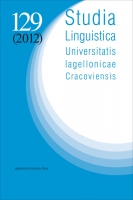Reflexivity in Modern Hebrew and Polish – contrastive remarks
Reflexivity in Modern Hebrew and Polish – contrastive remarks
Author(s): Marek PielaSubject(s): Language and Literature Studies
Published by: Wydawnictwo Uniwersytetu Jagiellońskiego
Keywords: reflexivity; Modern Hebrew; Polish; contrastive analysis
Summary/Abstract: 1. Naturally reflexive actions are expressed by intransitive reflexive stems in Hebrew and by transitive verbs with the reflexive pronoun się in Polish. 2. Actions that are not naturally reflexive are expressed by transitive stems with the reflexive pronoun ’acmo in Hebrew, and by transitive verbs with the reflexive pronoun siebie in Polish. 3. Adverbials with anaphors referring to a subject contain personal pronouns in Hebrew, the reflexive pronoun siebie in Polish, if the reflexive reference of the pronoun is not abnormal. Otherwise the reflexive pronoun ’acmo and the emphatic pronoun samego siebie are used. 4. If a pronoun referring to the subject is a predicate, then in Hebrew it always has the form of an ordinary personal pronoun, while in Polish both the personal and the reflexive pronoun is possible, depending on the copula.
Journal: Studia Linguistica Universitatis Iagellonicae Cracoviensis
- Issue Year: 2012
- Issue No: 129
- Page Range: 163-188
- Page Count: 26
- Language: English

